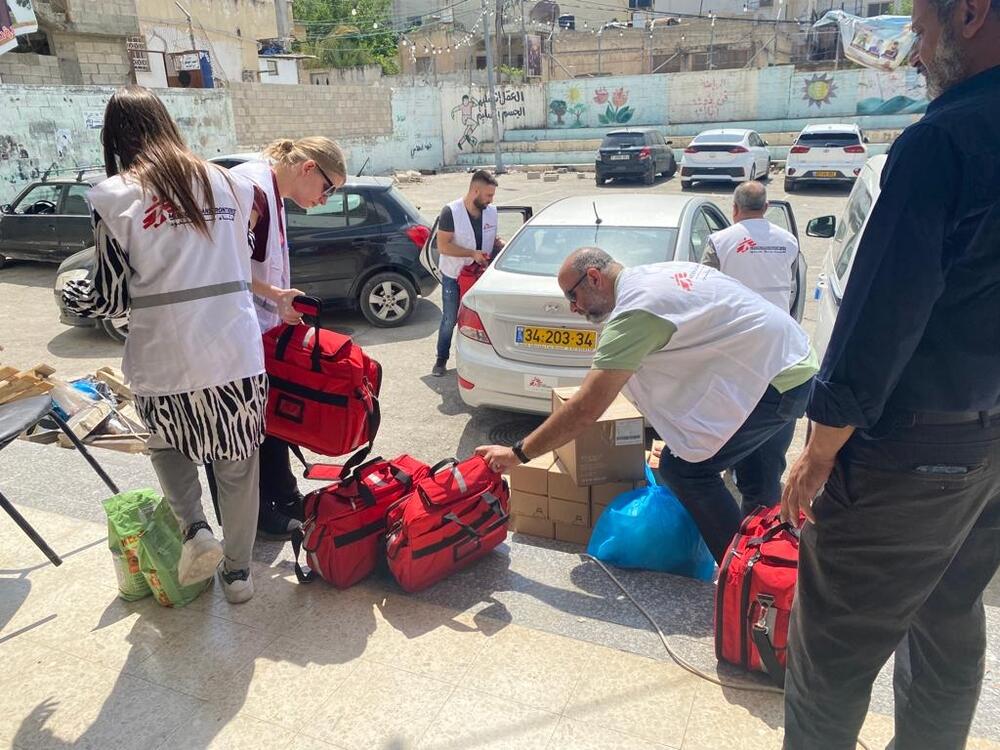West Bank: MSF treats wounded during large-scale military raid on Jenin camp
Médecins Sans Frontières / Doctors Without Borders (MSF) staff are currently providing emergency healthcare in the West Bank city of Jenin, following a large-scale raid by Israeli forces on a refugee camp.
This is the largest military action in the West Bank since 2002.
As of 3 July, at least eight people have been reported killed and 91 others injured in a ground and air attack that left many with gunshot and shrapnel wounds.
Beyond killing and injuring people, the raid has also affected healthcare facilities and obstructed the medical response to the emergency. Several gas canisters also landed in the courtyard of the Khalil Suleiman Hospital, where MSF staff had been treating patients suffering from gunshot wounds since 2 AM.
"The raids in Jenin are becoming more and more frequent, and their intensity seems to reach new heights,” says Jovana Arsenijevic, MSF Operations Coordinator in Jenin.
“We have received 55 wounded patients and have seen several patients with gunshot wounds to the head.”
Update
On 4 July, Israeli forces fired tear gas inside Khalil Suleiman Hospital several times, rendering the emergency room unusable.
"This is unacceptable," shared Jovana.
"The Emergency Room is not usable right now, it's completely filled with smoke, as is the rest of the hospital. People who need treatment can't be treated in the ER and we have to treat the wounded in the main hall on the floor. Our teams have treated 125 patients since the start of this raid."
Obstructing medical aid
Military bulldozers destroyed multiple roads leading to the Jenin refugee camp, stripping them of pavement and making it nearly impossible for ambulances to reach patients.
As a result, during the raid, Palestinian paramedics have been forced to proceed on foot in an area with active gunfire and drone strikes.
All roads leading to the refugee camp have been blocked for the duration of the military operation despite the presence of patients in need of care inside.
“We've been working for 15 hours and patients keep coming in,” says Jovana.
“This is an unprecedentedly long military operation, and yet there are still victims that cannot be reached. Healthcare staff must be allowed to access patients unhindered.”
“Nothing short of outrageous”
The 3 July raid has brought the number of deaths during Israeli forces’ operations in Jenin to 48 this year. With raids increasing in frequency, obstructions to medical care provision are on the rise, too.
Israeli forces in Jenin are increasingly resorting to air support, a worrying development in the use of violence. Today, at least 10 air attacks were reported in Jenin.
“Raids on Jenin camp have started to follow a familiar pattern – ambulances have been rammed by armoured cars and patients and healthcare staff have routinely been denied entry and egress to the camp,” continues Jovana.
“However, the use of attack helicopters and drone strikes in such a densely populated area represents a marked increase in intensity and is nothing short of outrageous.”
“What we see is that the hospital where we are treating patients has been struck by tear gas canisters. Medical structures, ambulances and patients must be respected.”
MSF has been working in the Occupied Palestinian Territories since 1989 and currently has medical humanitarian operations in Jenin, Nablus, Hebron, and Gaza.
MSF, conflict and war
In conflicts and war zones, MSF does not take sides. We provide medical care based on needs alone and try to reach the people who need help most.
